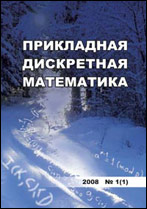|
This article is cited in 4 scientific papers (total in 4 papers)
Theoretical Foundations of Applied Discrete Mathematics
On the complexity of circuits in bases containing monotone elements with zero weights
V. V. Kochergina, A. V. Mikhailovichb
a Lomonosov Moscow State University, Moscow, Russia
b National Research University Higher School of Economics, Moscow, Russia
Abstract:
Complexity of Boolean functions and Boolean function systems realization in a base consisting of all monotone functions and a finite number of non-monotone functions is researched. The weight of any monotone function in the base is supposed to be 0, the weight of non-monotone function in it is positive. A. A. Markov studied special case of this base, where the non-monotone part consisted of the negation function. He showed that the minimum number of negation elements which are needed to realize an arbitrary function $f$ equals $\lceil\log_2(d(f)+1)\rceil$. Here $d(f)$ is the maximum number of value changes from 1 to 0 over all increasing chains of arguments tuples. The aim of this paper is to prove that the complexity of a Boolean function $f$ realization equals $\rho\lceil\log_2(d(f)+1)\rceil-\mathrm O(1)$, where $\rho$ is the minimum weight of non-monotone elements in the base. Similar generalization of the classical Markov's result concerning the realization of Boolean function systems is obtained too.
Keywords:
Boolean circuits, logic circuits, bases with zero weight elements, Boolean function complexity, circuit complexity, inversion complexity, Markov's theorem.
Citation:
V. V. Kochergin, A. V. Mikhailovich, “On the complexity of circuits in bases containing monotone elements with zero weights”, Prikl. Diskr. Mat., 2015, no. 4(30), 24–31
Linking options:
https://www.mathnet.ru/eng/pdm524 https://www.mathnet.ru/eng/pdm/y2015/i4/p24
|

| Statistics & downloads: |
| Abstract page: | 200 | | Full-text PDF : | 78 | | References: | 54 |
|




 Contact us:
Contact us: Terms of Use
Terms of Use
 Registration to the website
Registration to the website Logotypes
Logotypes









 Citation in format
Citation in format 
